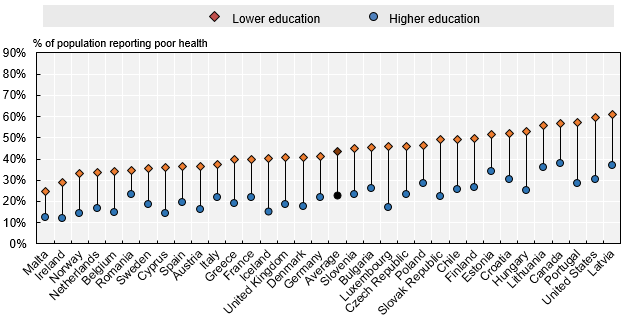Health

Health for Everyone?
Social Inequalities in Health and Health Systems
Good health is a key component of people’s well-being. It is a value in itself but
– through its influence on social, education and labour market outcomes – being in
good or bad health has also wider implications on people’s chances of leading a fulfilling
and productive life. Yet, even in the OECD countries, health inequality persists with
severe consequences on the goal of promoting inclusive growth. This report documents
a comprehensive range of inequalities in health and health systems to the detriment
of disadvantaged population groups in a large set of OECD and EU countries. It assesses
the gaps in health outcomes and risk factors between different socio-economic groups.
When it comes to health systems, the report measures inequalities in health care utilisation,
unmet needs and the affordability of health care services. For each of these different
domains, the report identifies groups of countries that display higher, intermediate,
and low levels of inequality. The report makes a strong case for addressing health-related
inequalities as a key component of a policy strategy to promote inclusive growth and
reduce social inequalities. It also provides a framework for more in-depth analyses
on how to address these inequalities at country level.
Published on September 27, 2019
In series:OECD Health Policy Studiesview more titles
TABLE OF CONTENTS
| Foreword | |
| Acronyms and abbreviations | |
| Executive summary | |
| Health-related inequalities: Framework and key findings | |
| Inequalities in health and its determinants | |
| Inequalities in the utilisation of health care services | |
| Inequalities in unmet needs for health care | |
| Affordability and financial protection: Insights from Europe |
Powered by OECD iLibrary

 Follow us on Twitter via
Follow us on Twitter via